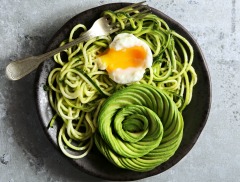Don't just meal plan... meal plan intelligently - with Meal Genius! Sign up for our free newsletter to get delicious recipes, sample meal plans and a whole lot more!
Seaweed, Spirulina
Spirulina refers to a large number of cyanobacteria, or blue-green algae.It contains unusually high amounts of protein, between 55 and 77% by dry weight, depending upon the source. It is also complete protein - meaning it contains all 9 essential amino acids.
In addition to proteins, spirulina is rich in vitamins, (providing more beta-carotene tha carrots), minerals, polysaccharides and fatty acids including gamma-linolenic acid (GLA), and also provides alpha-linolenic acid (ALA), linoleic acid (LA), stearidonic acid (SDA), eicosapentaenoic acid (EPA), docosahexaenoic acid (DHA), and arachidonic acid (AA).
Spirulina has been proposed by both NASA (CELSS) and the European Space Agency (MELISSA) as one of the primary foods to be cultivated during long-term space missions.
The Benefits
- Special diets: Autoimmune Paleo Diet, Candida Diet, Diabetic, Elimination Diet, Gluten-Free Diet, Gluten-Free/Dairy-Free Diet, Grain-Free Diet, Low Acid Diet, Low Carb Diet, Low FODMAP Diet, Low Histamine Diet, Low Oxalate Diet, Low Starch Diet, Paleo Diet (Light), Paleo Diet (Strict), PCOS Diet, Pescetarian Diet, Primal Diet, Thyroid Diet, Vegetarian Diet, Whole Food
- Excellent Source of: Copper
- Good Source of: Iron, Thiamin, Riboflavin
- Preferences: No Fish, No Red Meat, No Pork, No Eggs, No Shellfish, No Gluten, No Nuts, No Seeds, No Soy, No Dairy, No Poultry, No Molds, No Pseudograins, No Coconut, No Corn, No Yeast, No Peanuts, No Citrus, No Nightshade, No Legumes, No Grains, Low Carbohydrate, Low Cholesterol, Low Fat, Low Sodium, Low Sugars, Low Saturated Fat
Related Foods
Related Nutrients
Selecting and Storing









